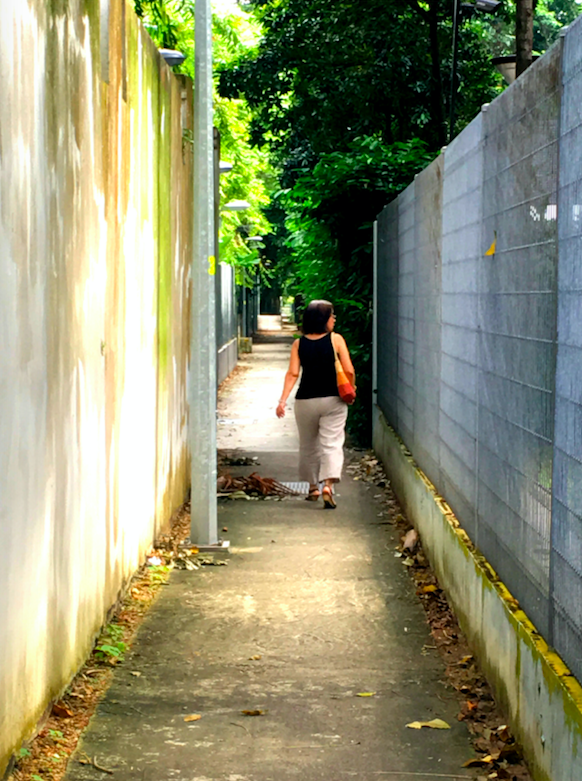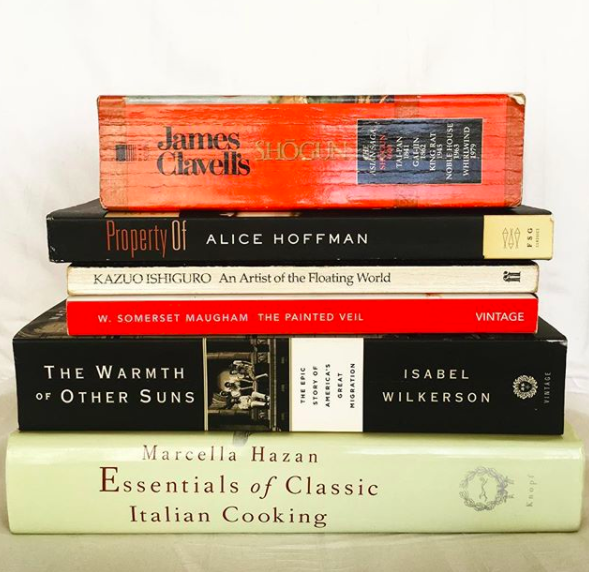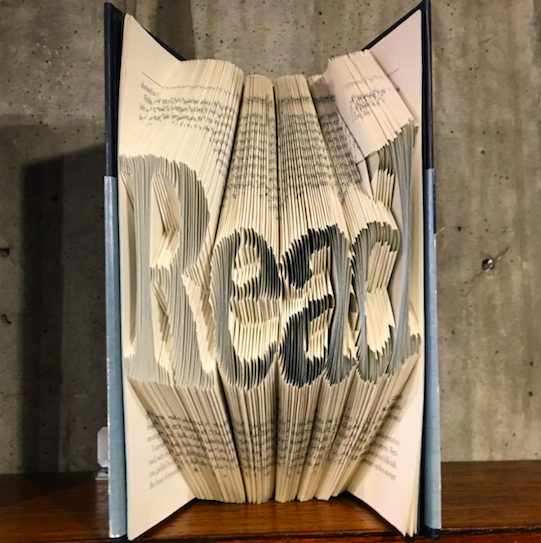On July 1, 2017 my short story The Ride Home appeared in the inaugural issue of The Shanghai Literary Review:

The bus swayed as it sidled back into traffic. Air conditioning scoured the windows, fogging the exterior in dribbling mist. The seats were cordoned by ribbed rails of dense fuchsia plastic. Gripping a pole to steady herself, a young Indian girl stood and motioned with a skinny arm. Natasha took the seat with a grateful nod. Such reminders of her age normally grated, but today her bags were heavier than usual. Or perhaps they just felt that way.
Cattycorner to her, in the center of the backbench, sat an older Chinese man with rings on the pinkie and ring finger of his right hand, each gold with a jade stone, one round and one rectangular. This hand darted through a series of gestures every time he spoke – a gruff blend of Teochew and Mandarin, syllables shushed and yanked. His left hand, twisted to display a fake silver watch, rested on his knee. The shells of his long ears gleamed waxy every time he turned to provide his simpering friends with another bon mot. When he wasn’t speaking, he stared straight ahead and smiled, repeating his own words in his head with relish. He decided they should get off and moved towards the door with the swagger of a teenage gang leader.
Natasha was reminded of her husband, the first one, though not because of the old guy’s looks (Jerome hadn’t been Chinese, at all). It was the swing of showy confidence, the high opinion of one’s wit and intelligence, the kind of arrogance that belonged only to the elderly or Americans.
Shedding her years, Natasha looked after them with the same shy interest she had fastened to the posturing boys in school. When two years of National Service had squashed the thrusting egotism of the local boys, she had been surprised at her disappointment. It was that easy to cool and iron out their fight? Jerome’s effortless, warm American noise, the self-assurance of his first proposal and the tender bravery of the second after she had turned the first one down, had seemed exquisitely permanent. Like most prim girls, she had been waiting for an invitation, for permission.
They had been 23. So young, ah? Cautioned parents, friends. They had been married just two years when he died. Her aunts tsked at the inevitability; the wedding had been on an inauspicious day, so what had she expected (and he hadn’t even given her a baby, they clucked in pity). It was a simple death. Sad, but straightforward. No mysteries to solve or regrets. He knew how much she loved him. She knew how much he loved her. Those two years. There was an endlessness there that she found extraordinary, impossible. Their blue skies and watercolor breezes bled into the white squares of her calendar, imprinting onto her days even now. On sharp-edged afternoons like this, heavy errands in Singapore’s blistering storm of sunlight, she held that small parcel of time in her mouth like an ice cube.
Oh, not that her marriage to Henry now – the decades of married life stockpiled – was bad. But it was the marriage she was supposed to have. No matter how attentive Henry was or how lovely their daughter, in her heart of hearts, Natasha considered her life a little less special than the one she almost had. Her first marriage had felt like she had stolen something, been truly selfish for the first time, looked her father’s expectations square in the eye and discarded them. She had nearly gotten away with it too.
Marrying Henry was safe, a neat clicking together of old family friends, her parents in ecstasy that their silly widowed daughter had been moored at last. Henry was a manager at a chemical engineering plant. And he was of Chinese descent, like them. So much easier. Her parents never had to explain Henry the way they had had to cobble together introductions for Jerome, an Egyptian-American who had been going for a PhD in Southeast Asian history when she met him. Jerome had been distressingly outside of their categories. Every odd glance on the street pained them. Every stuttered conversation about hopes for their future grandchildren. And implicit in their suffering were the accusations, silent or disguised.
Henry didn’t look out of place in family photographs, but gawky Jerome never shed the cloak of an interloper, his golden skin alien amongst their pale Asian faces. She had once heard her aunt whisper to her mother, “His skin cannot lighten a bit, ah? Maybe can try those whitening cream like from Taiwan, that type?”
But, as her father had been careful to reiterate almost every time Jerome was in the flat, Singapore was a harmonious multi-racial society and they believed in many races coming together to live in peace. And, of course, they weren’t against interracial marriages in theory. But, as her mother often muttered to friends in dialect, did they have to go so far as to be the poster family for it? Wasn’t being open-minded enough?
They must have breathed sighs of relief over Jerome’s body; he finally fit into a box they understood. It was a thought Natasha had had many times, first with a vicious bitterness, then a sore ache. Now, it was simply a fact, shriveled and ugly.
Natasha pressed the red, square STOP and began to pull herself to her feet. The trim businesswoman next to her hugged her purse into her stomach and twisted her knees into the aisle. Natasha scowled and pushed by, irritated that the woman hadn’t stood up. Jerome, homesick for the States, had regularly snarled at Singapore’s lack of graciousness, the stingy efficiency of strangers’ interactions. He moaned (though never in the presence of her parents) that he just wanted people to smile back when he passed them on the street. Safe in his one-bedroom apartment, he had laughed at the government’s campaigns to encourage kindness, the jejune posters on the buses. When Natasha had blushed, embarrassment and wounded pride, and pointed out that the campaigns were working, he laughed harder.
Ginger steps brought her down to the curb, hot sunshine soaking her through. She worried about the greens and peered into her plastic bag for hints of their wilting. Then, impatient with her old-aunty fussing, she retrieved her umbrella and launched it open. For the short distance through the courtyard of the housing development, she was escorted by a personal, carefully-apportioned shadow. She risked a glance up, through the piercing light, at the carefully-apportioned public housing, thinking how in other countries, government-sponsored tenements were derided. In Singapore, they were expected, demanded.
“Na-ta-shaa!”
The whine of their neighbor rolled up to greet her as she shuffled off the elevator. The open-air corridor channeled the warm wind. The woman stood in her doorway, parental nerves and antique superstitions bundled in rolls of fat mercifully hidden beneath a head scarf. Her full-length dress, always coordinated purples or blues, pinched at her wrists.
“Your mother forget me already, is it? You know, yesterday, I say hello three times,” she said, chin wobbling above a faux crystal brooch as she thrust up three plump fingers. “Three times leh! And she just…” Her eyes bulged wide in pantomime, sharp white and black in their frame. “Like know-nothing one.”
She stared at Natasha with aggression, expectancy, defiance, her simple and spoiled ego on display. Natasha clucked.
“Aiyo, she’s sick, you know.”
“Oh, sick, is it?” She echoed with a rearranging of purple layers and emotions. “Can fix or not?”
“Dunno lah,” Natasha sighed, unlocking their front door.
“You know, there’s ve-ry good program for memory. I make my girl go. One session only and wah! Because my girl, you know, exams so hard now. How to prepare?”
“I’ll think about it.”
“One session only, siah!”
“Talk later, can? Must cook lor.”
After stepping inside and out of her shoes, Natasha exhaled with force. A child’s cry echoed somewhere. Linoleum, scrubbed by her mother in the past, these days by her, clung to the sweating soles of her feet. The lingering smell of chili peppers nicked her nostrils. A fan whirred in the corner of the living room, its breath flipping up the pages of a magazine. The windows, elegantly barred, provided a sliver of sky between the other buildings of the complex, all mirror images of each other.
Their family had swollen in number and pressed against these walls, three generations quibbling over bathroom sinks and crowding around the table for dinner. Being part of a family meant claustrophobia, supporting grandparents while being prodded to have children, and then it meant bewildering lack. The departures of the dead and the married children hollowed out the small apartment, painting it in shades of agoraphobia.
Her mother lorded over the flat, a ragged cat feeling her way around, dull claws picking over furniture she had pushed under her children, grandchildren, husband, guests. Her hunched memory and whittled eyesight dimmed the rooms.
“Jerome not with you, ah?” Her mother asked in crunched Hokkien from her place on the couch.
“Jerome? Ma, you mean Henry.”
“Aiyo!” And she smacked her forehead in a grand gesture, as though it was all part of an act. “I was just testing lah!”
“I know, Ma.”
They had been saying that a lot lately. A hit duet. Natasha felt a scream pull at her ribs and push at her throat. A desire for violence pulsed through her. She wanted to watch her mother groan and struggle and win; not silently misplace people, places, facts. Not mask and forget that she was forgetting. When she finally went, she would take hunks of Natasha with her. She wanted to puncture the scene, to shake her mother and declare that everyone knew she was losing precious, precious things and that foisting on them this feeble excuse that she was playacting was desperately sadder than if she just accepted it. Or maybe it wasn’t. How could anyone gauge one agony against another?
Her mother fiddled with her empty coffee mug. The expectation and need for her daughter to believe her threw shadows across her wrinkled face, flimsy but impenetrable.
“Henry will be home in an hour.” Natasha said, unpacking her canvas shoulder bag.
Library books. The fresh greens for dinner. A text from her daughter waiting on her phone. Natasha stopped.
“Hey Ma,” she said, turning and approaching the withered woman on the couch serenaded by expensive cable television. “Why were you thinking of Jerome?”
“Jerome, ah?” Her mother mused, twisting the cup in place, the porcelain a mean, youthful white in her knobby and spotted fingers. “Don’t think I know. It’s the provisions-shop delivery guy, is it?”
“What?”
“I don’t think I know Jerome lah.”
Natasha’s eyes burned into her mother’s vague face.
“Natasha?”
“More kopi?” Natasha asked, snatching up the coffee cup before anything else left her mother’s open mouth.
She returned to the groceries, sorting them into the fridge and pantry, measuring her breaths. The coffee machine gurgled. In a sulk, Natasha’s gaze drifted to the balcony. It was narrow and pale peach, empty except for a stubborn trio of cactuses, crisping brown at the edges and coughing up tiny mauve flowers.
Jerome had once fucked her out there, with all the family asleep in humid rooms bullied by air conditioners several paces away. She had tried so hard to enjoy it, but guilt and fear had drowned the sense of adventure she knew Jerome had been trying to spark in her. Even now, the memory was impossible to appraise calmly. It was as though she were trying to examine an ember burning in her palm.
She considered it the most grotesque thing she had ever done. A marriage, no matter how peppery and resented, is still tied off with a bow, a fine conversation topic and a respectable act. But sex? The word itself skittered across the floors of the flat, searching in terror for the safety of darkness. The gulf between marriage and children went undiscussed. It was presumed that, somewhere behind a closed door, you would learn to swing over it on a rope without looking down, like everyone else.
She half-remembered half-imagined how quietly Jerome had slid the curtains closed, and then the balcony doors. He had put his hand behind her head and, kissing her, lowered her onto the off-white tiles. Guarded by hanging laundry, the balcony wasn’t really long enough for them to lie down. Her hand came into contact with cement, grazing her knuckles as she crooked and bent and accommodated.
A whispered ‘Wait’ almost left her mouth, but didn’t. Surely, he deserved something from her, some concession for spending the entire day and evening crushed into the apartment with her family. So, she had pretended to be excited when his fingers pushed up her skirt and dragged her panties aside. She had reached for his fly and maneuvered out his erection, because she knew he wanted her to. As he heaved into her, she kept her eyes on the thin black break in the curtains, petrified that a hand would worm through to pull it aside. It was a truer loss of virginity than her first time had been.
Over the years, the vacant minutes she stumbled upon – between pages of a dull book, while pans gathered heat from the stove, TV commercials – brought her eyes to the balcony and to the memory of their violation of it. The rectangular, peach container seemed filled to the brim with an emotion that charged all facets of her. Anger at Jerome, which then splintered into defiance of everyone but him. Disgust at her childishly sculpted sexuality, then pleasure at Jerome’s soft fingers molding it further. Pain at the memory’s presence persisting beyond Jerome’s, how it cooled into permanence while other aspects of him faded. The wrestle of giddiness and guilt whenever Henry and her father leaned over their elbows on the balcony, conversing in serious tones not meant for her or her mother’s ears.
And, all of a sudden, for the first time, Natasha thought of that crumpled coupling with pride, a pride so clear and fierce that she was sure her mother would be able to taste it in the coffee. It waved like a bright, rough-edged flag. She had spent years jiggling in fear and shame, wondering whether her family knew and what they must have thought. But her grandparents and father had passed years ago. Her mother’s prejudices were being sluiced off that (and every other) memory of Jerome. He was hers again, vibrant and young and perverse, ego glowing. At least, until she too returned a memory to the fastidious shelves of her mind, and later, when she went back for it, found it had moved.

–



